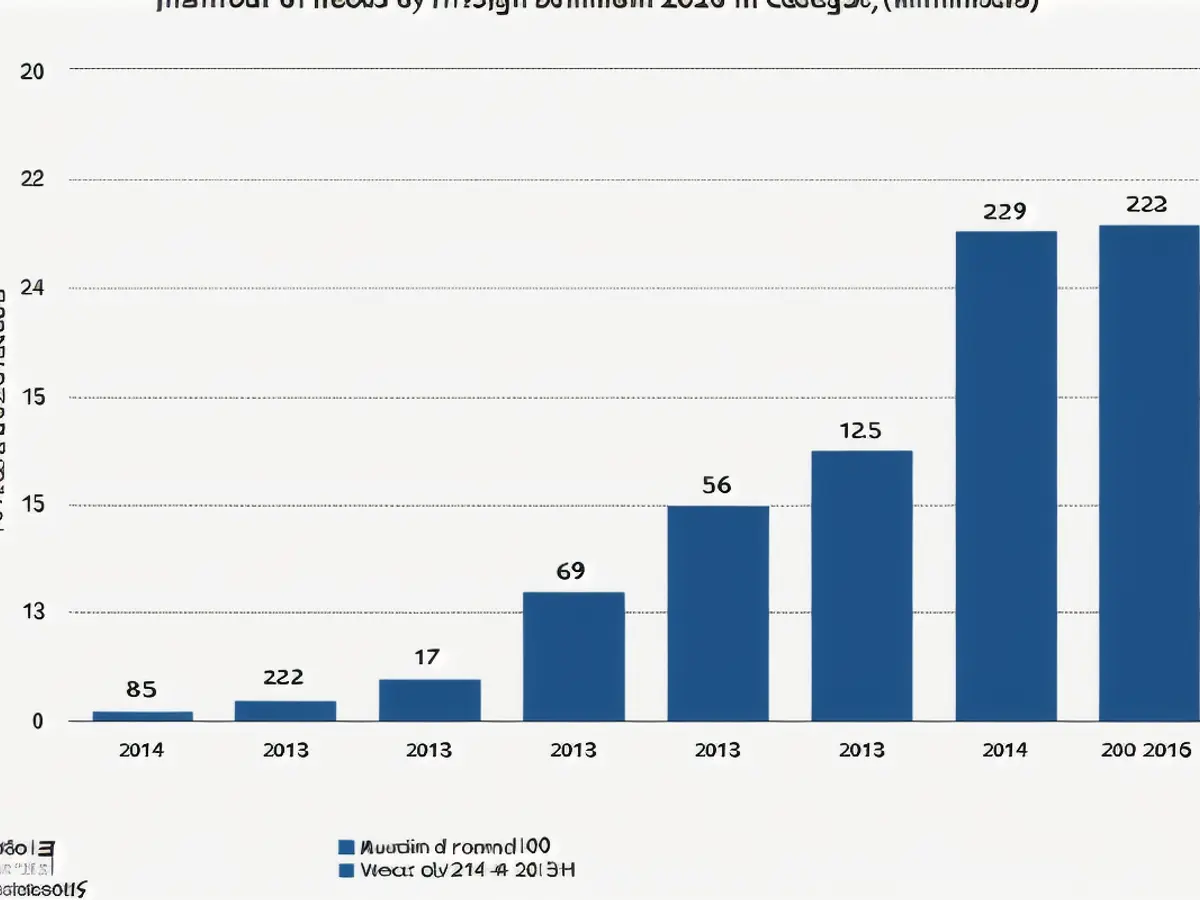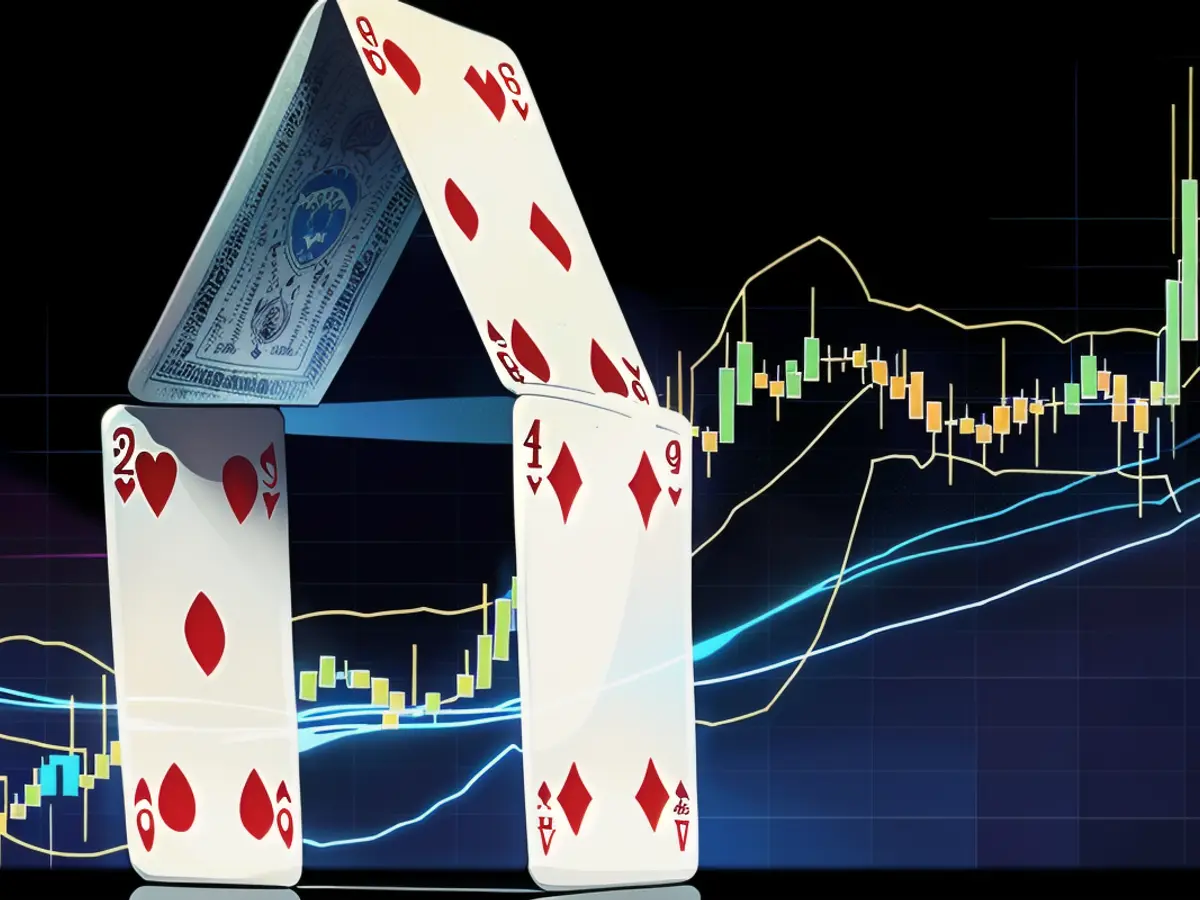Comparing Gambling and Investing: What's Your Choice and What Distinguishes Them?
In recent years, the lines between gambling and investing have become blurred. Meme stocks, dogecoin, and tesla options are just a few examples of how these two activities have intersected. But what truly sets them apart?
Key Concepts
- Investing anticipates rewards over time, whereas gambling is often seen as random and shorter term.
- Investors can research and act on risks, which add more depth to their decisions, whereas gamblers rely on luck.
- Investments benefit both parties, while gambling is winner-takes-all.
Gambling vs. Investing: Definitions
Investing can be defined as putting resources into something with the hope of future returns. This could involve buying real estate, stocks, or bonds. Research and asset allocation are essential factors in improving one's chances.
Gambling, according to the Merriam-Webster dictionary, is the practice of risking money or other stakes in a game or bet. For our purposes, consider gambling as the wagering on a random event to win something of value.
Investing vs. Gambling: Identifying the Differences
Investments may seem arbitrary over the course of several months or years. However, studies show that overall returns on assets like houses and stocks increase over time. Minimizing fees, diversifying your portfolio, and research can help ensure investments grow.
Gambling, on the other hand, is based on random events like spinning a roulette wheel. Over time, the longer you gamble, the more likely you are to lose money due to the house's built-in advantage.
Are All Investments Gambles?
Buying dogecoin with no intrinsic value or participating in a pump-and-dump scheme could be considered gambling. But what about investing in quality stocks with long-term potential?
Weighing the Risks
Investing and gambling differ in their risk management strategies. Investors aim to diversify their holdings and assess short-term and long-term risks. They see their assets as growing over time. Gamblers, on the other hand, tend to focus on punting for massive short-term gains at the expense of risk management.
Risk vs. Reward
The most evident distinction between investing and gambling is in how both are managed. Investors leverage resources to gain value, while gamblers rely on luck and short-term gains.
Research and Exposure
Investments, like cryptocurrency or even gold, can be evaluated to determine their potential for growth over time. Research can help us make more informed decisions about what to invest in.
Conversely, gambling relies on pure luck and can't be systematically analyzed or managed.
The Impact of Technology
Apps like Robinhood, which offer commission-free trading, have drawn more people to the stock market. With users increasing from 500,000 in 2014 to 23.5 million in 2024, it's clear that these platforms have made investing more accessible.
The emergence of meme stocks and cryptocurrencies attracts investors who may not have a thorough understanding of risk management.

Conclusion
Investing and gambling may have some similarities, but their core principles are vastly different. Investing is about managing risk to achieve long-term gains, while gambling is about risking everything for short-term rewards.
So whether you're investing in a company or participating in a meme coin frenzy, it's crucial to understand the risks and potential rewards.
Studying the S&P 500 will reveal that it generated an average annual return of over 12% over the past decade. This means an investor could double their investment in roughly six and a half years with such returns. Despite losing money on individual stocks or having stock investments lose money temporarily, a diversified portfolio rarely depreciates significantly over timeframes of a decade or more.
Similarly, betting on black in a casino might double your money in a single turn. However, each bet costs you 5.27% in American casinos, meaning you'll lose the equivalent of one regular bet in around twenty spins. Hence, if you wager $25 per spin, you'll likely lose between $50 and $75 per hour.
Excitingly, an experienced and trained blackjack counting team with a bankroll of $100,000, favorable house blackjack rules, and the ability to place bets ranging up to eight units can potentially earn up to $300 per hour per team member while incurring a 2% risk of losing their entire bankroll during their gameplay. As their bankroll increases, this risk reduces.
The Key Difference Between Investing and Gambling: Who's Winning?
Another contrast between investing and gambling lies in determining who benefits. Betting generally involves opposing parties with a single winner and loser. Investing, however, is more about finding a mutually beneficial outcome.
For instance, if I purchase Treasury bills, I'm essentially loaning the government money to meet their obligations. Both parties gain something they desire. If I trade a long position in soybean futures through the Chicago Mercantile Exchange, I've obtained a price I desired for my commodity, while someone else has locked in that price for future delivery. Both parties are content with the outcome.
On the other hand, if I bet $100 on the next golf shot or pickleball match against you, one of us emerges victorious, while the other incurs a loss. This win-lose relationship, in addition to common issues related to gambling addiction, such as the possibility of massive profits, the fast speed of games, and alternating highs and lows, has frequently led to the restriction or illegality of gambling. In contrast, investing is routinely praised as a way to create intergenerational wealth and strengthen national economies.
Does Day Trading Count as an Addiction?
Like gambling, the excitement and satisfaction of day trading, seeing investments pay off, can be addictive to some individuals.
Gambling addiction issues, like the hope of striking it rich, the fast pace of games, mix of highs and lows, and risk-taking to regain that positive emotional state triggered by past successes, are also present in stock and share trading.
Although becoming absorbed in a game or market can initially seem harmless, countless studies have highlighted how any form of addiction may cause players to lose touch with reality and potentially face severe financial consequences.
Conclusion: The Boundaries of Investment and Gambling
It's often challenging to determine the distinction between a wager and an investment. Furthermore, today's Wall Street and cryptocurrency markets and stock trading apps impersonating brokerages, combined with brokerages proclaiming themselves as risk-free ways to earn money, only add to the confusion.
To clarify, remember that investments should entail a reasonable expectation of profit, involve manageable risk, help finance both parties' desired outcomes, and be supported by thorough research. If these conditions are met, you can rightfully define it as an investment. However, keep in mind that these investments are not immune to potential dangers.
For further insights, check out our article on investment scams.
Share this: link_to

Read also:
- Habeck alleges that Israel is breaching international legal norms.
- Conflict in Ukraine: a current overview
- Schalke nears massive changes
- Funkel expresses gratitude and bids farewell, though it seems insufficient.








